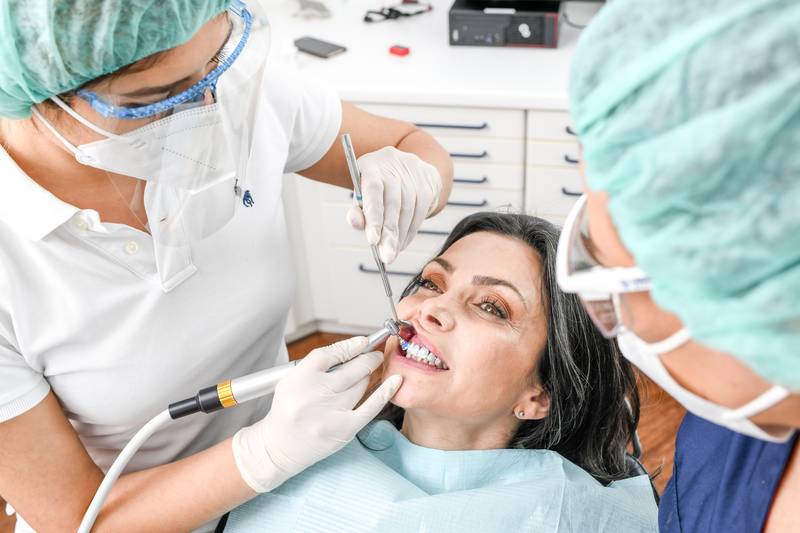Health is highly valued by the general public — not least because of our ageing society. Oral prophylaxis has therefore become a focus of modern dental practices and is an important step toward preventive solutions, also in the area of general medical problems. "Young patients as well as increasingly old groups of patients want to, if possible, maintain their teeth throughout their lifetimes and prevent oral diseases. The German dental industry offers a continuously growing variety of products and aids for professional and domestic oral care — from toddlers right through to the very old," explains Dr. Martin Rickert, Chairman of the Board of Directors of the Association of German Dental Manufacturers (VDDI). An important task for dentists and their dental practice teams is to provide patients with extensive and individualised information that is relevant to their age, as well as ensuring that this information is put into practice. In addition to supporting dental care at home, dental practices also provide regular professional tooth cleaning, which, thanks to modern methods and supporting diagnostic treatments, creates the basis for sustainable oral health. Every form of dental prophylaxis is supported by intensive research and development conducted by the dental industry. The latest concepts of prevention therefore also enable the continuous improvement of hygienic dental aftercare, for instance after prosthetic, implant or endodontic surgery. In general, a wide range of professional preventive measures are now becoming available to dental practices. These measures can be used by dentists, dental assistants, dental prophylaxis assistants and dental hygienists to successfully specialise and supplement the range of services their dental practice provides. The 34th IDS (Cologne, 22nd to 26th March 2011) will therefore be a particularly valuable source of comprehensive information on the topic of preventive care. In order to meet the growing demand for effective individual prophylaxis, the dental industry is developing suitable instruments, diagnostic processes and concepts. This contributes towards the optimal management of the oral biofilm and promotes successful prevention at home as well as in the professional field. Modern aids improve prophylaxis at home Effective plaque control through daily oral care at home is an important part of prophylaxis and is carried out today with the help of very functional and ergonomic aids for brushing teeth, as well as for other hygienic measures. These include both modern manual toothbrushes and the highly effective electric toothbrushes. The latter may also feature external motivational displays and other helpful tips for the user. And the special snap-on brushes can perform a number of different tasks. At IDS 2011, the whole spectrum of current toothpaste formulations will also be introduced. These new formulations contain scientifically developed recipes designed to address different specific needs and help provide a good basis for the daily prophylaxis of individuals in all age groups. It may amaze some to know that the correct combination of a toothpaste and an electric toothbrush can significantly raise the effectiveness of the latter.1 They are assisted by effective mouthwashes, which are also important for preventive care at home. These are supplemented by special interdental brush systems, dental floss and sticks, as well as many other products. In addition, special gels to combat dryness of the mouth are becoming increasingly important — especially with an aging society. Growing numbers of patients suffer from xerostomia, which, among other things, can be caused by the use of different medications, especially those prescribed for senior citizens. Professional prophylaxis and diagnostics are essential The desire to maintain one’s natural teeth for as long as possible requires the help of a dentist. Only professional preventive measures in the dental practice can enable patients to control and avoid caries, gingivitis and other common oral diseases. Here the focus is on the development of age-specific individual preventive care concepts for the maintenance of oral health. Preventive measures, such as professional tooth cleaning and minimally invasive ultrasound-aided periodontal treatment and maintenance therapy, are of central importance and are carried out by dentists or dental technicians. The dental industry currently provides holistic treatment systems in this area. These can completely prevent additional infections, which would particularly benefit patients with an increased risk of caries, inadequate oral hygiene or many dental restorations. In the areas of orthodontic procedures and surgery, aftercare of implant treatments and other dental measures, these treatment systems can be a deciding factor in the success of the whole procedure. A highly developed diagnostic procedure is also important for successful prophylaxis. Today, modern analytical and imaging processes in dental practices are used. Thanks to modern diagnostic tools, oral diseases such as enamel caries, root caries, peri-implantitis, gingivitis and periodontitis can be diagnosed in their initial stages. In addition to traditional procedures, these tools include high-resolution intraoral cameras, camera-supported fluorescence methods and digital X-ray systems. Furthermore, some manufacturers also offer molecular-biological and biochemical diagnostic systems, which can help to identify oral illnesses by means of their respective germ spectrums and analyse the risks involved. Current scientific research results show that nearly one third of the human genome is involved in gingivitis!2 In other words, the importance of "biologising" dental prophylaxis can hardly be overrated. Patients are becoming increasingly aware of the relationship between oral hygiene and systematic health. Accordingly, there is a lot of interest in treatments that maintain tooth structure and periodontal structures over the long term. Prevention based on individual needs, which also offers concepts for all age groups, is therefore increasingly becoming the key to the sustainable success of dental practices. Dentists who focus on preventive treatments are now already receiving assistance from the dental industry, which has for many years now been experiencing a paradigm shift from restorative treatments to individual preventive treatments, and has supported the integration of prophylaxis into everyday processes in dental practices through its scientifically developed technical innovations. This provides dental practices with an excellent opportunity to specialize in a specific field. A prophylaxis team that has received the latest training can assess the individual risks from the very first examination and, as a result, greatly improve the health of the individual patient. This in turn will also raise the expertise, and thus the reputation, of the practice. It will also improve the patients' willingness to return for follow-up appointments, as well as to implement oral hygiene correctly at home. At the next International Dental Show (IDS) in Cologne (22nd to 26th March 2011), the solutions presented by prophylaxis specialists from many renowned companies in the dental industry will show how these preventive measures and specialization opportunities can be integrated into the day-to-day routine of a dental surgery. These specialists will be available throughout the trade fair to share their knowledge and experience with the trade visitors. Of course, visitors will also have the opportunity at IDS to ask questions and discuss problems with the experts. A unique international forum will be set up where trade visitors can talk to specialists about every aspect of modern prophylaxis. Therefore, IDS is the ideal opportunity for dentists and dental technicians to find out all the latest information on dental hygiene and how to implement prophylaxis in their dental practice — as well as discovering how to integrate complete treatment systems for the prevention of oral diseases. “From 22nd to 26th March 2011, the International Dental Show in Cologne — the world’s largest trade fair for dental medicine and dental technology — will be the best place for dentists and their assistants to talk to specialists from the exhibiting companies and experienced users about the whole spectrum of modern prophylaxis concepts and current trends in preventive treatments and diagnostics,” says Dr. Markus Heibach, President of the VDDI. IDS, which takes place in Cologne every two years, is organized by Gesellschaft zur Förderung der Dental-Industrie mbH (GFDI — Society for the Promotion of the Dental Industry), the commercial enterprise of the Association of German Dental Manufacturers (VDDI). The trade fair is staged by Koelnmesse GmbH, Cologne. Note for editorial offices: Photos from the last IDS Cologne are available in our photo database on the Internet (english.ids-cologne.de) on the Photo pages of the Press section. Literature 1. Klukowska M, White D, Barker M, Bartizek R.: Wirksamkeit von Zinnfluoridzahncreme gegen Plaque bei Anwendern einer elektrischen Zahnbürste, J Dent Res. 2007; 86 (Spec Iss): Abstract 1740. Steven Offenbacher, Silvana P. Barros, David W. Paquette, J. Leslie Winston, Aaron 2. R. Biesbrock, Ryan G. Thomason, Roger D. Gibb, Andy W. Fulmer, Jay P. Tiesman, Kenton D. Juhlin, Shuo L. Wang, Tim D. Reichling, Ker-Sang Chen und Begonia Ho, Gingival Transcriptome Patterns During Induction and Resolution of Experimental Gingivitis in Humans. J Periodont 80(12), 1963-1982 (2009) If you reprint this document, please send a voucher copy.
- Alter:
5102 Tage



